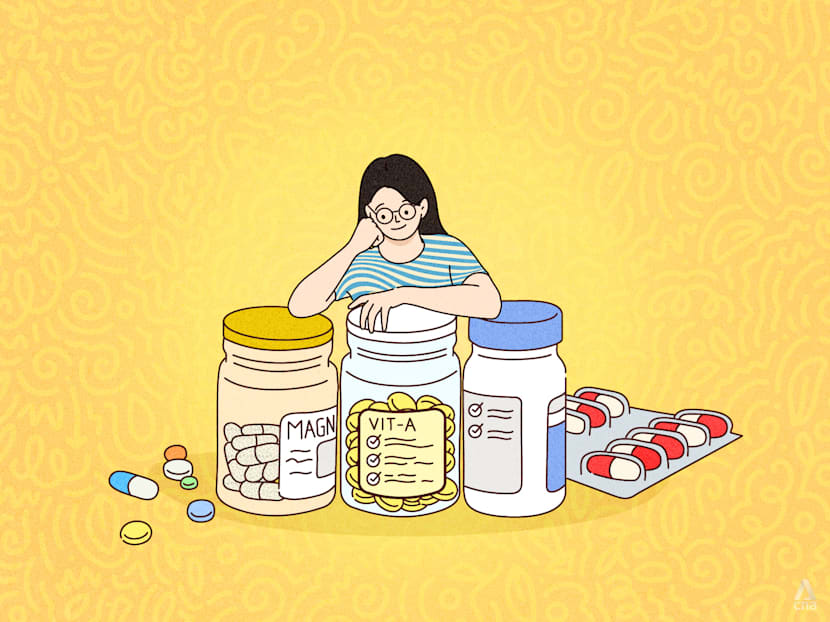Do you really need supplements to give you more energy, clearer skin or better sleep?
Nutritional experts cautioned against self-prescribing health or dietary supplements, highlighting risks of "megadosing" and interactions with medication.

Medical experts caution consumers against self-prescribing dietary supplements as a quick-fix solution for symptoms. (Illustration: CNA/Samuel Woo)

This audio is generated by an AI tool.
Adulthood is not just one phase of life but comes in stages. Its many facets can be overwhelming, from managing finances and buying a home to achieving work-life balance and maintaining healthy relationships. In this series, CNA TODAY's journalists help readers deal with the many challenges of being an adult and learn something themselves in the process.
I still remember when I first found out I had iron-deficiency anemia more than a decade ago. At a blood donation drive, I was told the blood bank could not accept my donation due to low haemoglobin levels and I was sent home with some iron supplements in hand.
Since then, I've taken these pills on and off over the past decade, often loosely following the recommended dosage and popping them only when I'm especially fatigued or craving an instant pick-me-up.
Cautious about becoming overly dependent on supplements, I've tried filling the nutritional gap through dietary changes.
Earlier this year, however, a health scare shifted my perspective. In May, persistent fatigue and shortness of breath prompted me to see a doctor.
A blood test revealed low iron levels: I needed a blood transfusion and had to recommit to regular supplementation.
While browsing online for supplements, I found myself overwhelmed by the sheer variety.
The more I searched, the more supplement brands I encountered, along with various vitamins and minerals beyond the iron pills I needed – accompanied by advertisements promising more energy, clearer skin, better sleep and sharper focus.
Friends around me also reinforced the idea of supplementation, especially approaching our 30s, which left me even more conflicted.
Are supplements truly essential or could diet alone fix my deficiencies? And if I did choose to take supplements, how would I know what to pick and what should I look out for to ensure I wasn't just wasting money on useless pills?
ARE SUPPLEMENTS NECESSARY TO STAY HEALTHY?
Nutritional experts said that generally, a balanced, nutrient-rich and intentionally planned diet is enough to meet the nutritional needs of most healthy individuals.
Dr Kalpana Bhaskaran, president of the Singapore Nutrition and Dietetics Association (SNDA), emphasised that supplements are not a replacement for food.
After all, whole foods contain fibre, phytonutrients and synergistic compounds that health or dietary supplements cannot replicate.
Whole foods refer to minimally processed foods that are close to their natural state, including edible parts of plants (leaves, stems, roots) or of animals (meat, flesh, eggs). Minimally processed foods also include tofu and other soy products, mushrooms, nuts, dried fruits, brown or white rice, as well as frozen vegetables, meat, fish and poultry.
Dr Alvin Wong, senior principal research dietitian from the Department of Dietetics at Changi General Hospital (CGH), said: "We can get our nutritional needs from food most of the time, so food should come first. Individuals can consider taking supplements to address specific gaps, but not to 'supercharge' an already healthy diet."
However, the experts acknowledged that supplementation can be beneficial in certain circumstances such as when the person is ageing or has nutritional deficiencies, increased nutrient requirements during pregnancy, or chronic illnesses requiring long-term medication that may affect nutrient absorption.
Ms Rachel Tok, a dietitian from the Department of Dietetics at National University Hospital (NUH), said that as people age, changes in the gastrointestinal tract can reduce nutrient absorption and affect one's appetite, digestion and gut motility.
These changes can begin as early as age 40 but usually become more pronounced after 70, she added. Common nutritional deficiencies among older adults include vitamin D, vitamin B12, calcium and iron.
However, despite decreased nutrient absorption, older adults can still meet their nutritional needs by consuming more nutrient-rich foods, Ms Tok said.
For instance, dairy products can boost calcium intake, while fatty fish and fortified fruit juices can increase vitamin D levels.
Some people may also choose supplements if diet alone is not enough or achievable, she added.
"Whether a nutrient deficiency can be corrected through diet alone depends on the severity and underlying cause of the deficiency."
For example, for people with mild iron-deficiency anemia, Dr Kalpana from SNDA said that the condition might improve through dietary changes such as eating iron-rich foods that include red meat or spinach, alongside vitamin C-rich foods to boost iron absorption.
However, moderate to severe cases usually require iron supplements, because diet alone is typically not enough to quickly replenish iron levels.
Starting supplements should be approached with the same careful considerations as taking medications.
What consumers should not do is to start self-prescribing dietary supplements as a quick-fix solution for symptoms, the experts cautioned.
As a general guide, Dr Kalpana's advice is that people experiencing symptoms should first review their diet and lifestyle to identify common issues such as inadequate sleep, poor nutrition, stress or dehydration and address those before considering supplements.
Maintaining a balanced diet that includes varied food sources from all food groups can help to provide nutritional adequacy without the need for supplementation in healthy older adults, Ms Tok from NUH said.
She added that other lifestyle changes could include:
- Spending five to 30 minutes in sunlight between 10am and 3pm twice a week to boost vitamin D production
- Pairing meat with vitamin C-rich foods such as fruits during meals to enhance iron absorption
- Consuming calcium-rich foods such as dairy at least one to two hours apart from meal times to further boost iron absorption
If, despite lifestyle and diet changes, symptoms persist beyond two to three weeks or begin disrupting daily activities, they should consult a doctor or healthcare provider, Dr Kalpana said.
She advised getting clinical evaluations or blood tests done, so that dietary changes or supplements can be tailored to the person's needs based on the results.
These tests can pinpoint nutritional gaps, since deficiency symptoms are often vague and may overlap with other health conditions, she explained.
Useful tests include a complete blood count to screen for anemia, or thyroid function tests, since thyroid disorders can present as fatigue and low mood – symptoms commonly mistaken for nutrient deficiencies.
In such cases, seeking medical advice can ensure that you get an accurate diagnosis, identify the exact cause of symptoms and rule out other potential health concerns.
Dr Wong from CGH said: "Starting supplements should be approached with the same careful considerations as taking medications."
The experts also highlighted the common misconception that consumers have, that taking more supplements makes one healthier.
Megadosing – which refers to consuming vitamins, minerals or medications at levels far exceeding what is normally recommended or considered safe – can lead to toxicity, they cautioned.
"Water-soluble vitamins like B and C are usually safe, as excess amounts are flushed out in urine. However, fat-soluble vitamins (A, D, E, K) and minerals pose a greater risk since they accumulate in the body," Ms Tok said.
For example, excessive vitamin A intake can lead to symptoms ranging from nausea and vomiting to liver damage. Similarly, too much calcium may lead to soft tissue calcification or kidney stones, or hinder the absorption of other nutrients such as iron, she added.
For reference, HealthHub, the national digital healthcare website, publishes the Recommended Dietary Allowance (RDA) guidelines. The RDA indicates the recommended daily nutrient intake required to meet the needs of nearly all healthy individuals within specific age and gender groups.
Another thing to note is that taking high doses of individual nutrients or combining multiple products containing overlapping ingredients is not only cost-ineffective, but may also lead to toxicity, adverse drug interactions or interference with diagnostic test results, Dr Wong from CGH said.
For example, people taking high-dose biotin supplements – used to boost biotin, a B vitamin – should inform their doctor before any blood tests, because it can interfere with test results including heart and thyroid tests, he added.
NOT ALL SUPPLEMENTS ARE MADE EQUAL
If you've gone through these steps and still require supplementation to address nutritional deficiencies, Dr Kalpana offered the following best practices:
- Follow dosage instructions: Stick closely to the recommended dietary allowance or your doctor's prescription. Again, note that taking more isn't always better
- Pair supplements with meals when necessary: Fat-soluble vitamins such as A, D, E and K are best absorbed when taken with dietary fats, which can be found in foods such as fatty meats and butter
- Space out competing minerals: Minerals such as iron, calcium, magnesium and zinc can compete for absorption and they should be taken separately
- Check for interactions with medication: Some supplements, including vitamin K, can interfere with medications such as the blood-thinner Warfarin
Given that there are numerous supplement brands available, how can consumers choose a reliable product and verify its credibility?
Dr Kalpana advised consumers to check for brand transparency. Reputable companies clearly disclose their manufacturing locations and quality-control standards and these are usually indicated on the bottles.
They also typically publish certificates of analysis from independent laboratories. When reading labels, look for evidence of third-party testing and certification such as seals stating "USP Verified" "NSF Certified", "ConsumerLab Approved" or "Informed Choice" – which confirm a supplement's purity, potency and safety.
Clear ingredient lists that avoid vague "proprietary blends" and contain minimal fillers or additives such as artificial dyes are also positive indicators, Dr Kalpana said.
Conversely, consumers should be wary of exaggerated claims, for example, promises to "cure cancer", "melt fat" or "instantly boost immunity".
Finally, supplements that appear unusually cheap should be viewed with caution, because low-priced products often compromise on quality or contain inferior raw materials, Dr Kalpana added.
Ultimately, from a dietetic perspective, optimising dietary quality is always the goal when building the foundation of nutritional health, aiming for a balanced diet centred on minimally processed, whole foods, Dr Wong from CGH said.
On top of this, ensure that you get adequate protein intake, appropriate sun exposure, quality sleep as well as resistance and balance training, stop smoking and keep alcohol consumption moderate. These are the fundamental components of optimal health, he added.
"Research consistently demonstrates that these comprehensive lifestyle modifications deliver significantly greater and more robust health benefits than any individual supplement," Dr Wong said.
"From a clinical standpoint, supplements should be positioned as supportive tools that complement a healthy lifestyle, rather than substitutes for proper nutrition and evidence-based healthy living practices."














